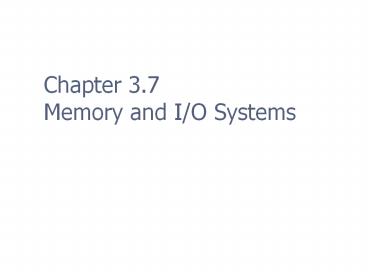Chapter 3.7 Memory and I/O Systems - PowerPoint PPT Presentation
Title:
Chapter 3.7 Memory and I/O Systems
Description:
Chapter 3.7 Memory and I/O Systems – PowerPoint PPT presentation
Number of Views:160
Avg rating:3.0/5.0
Title: Chapter 3.7 Memory and I/O Systems
1
Chapter 3.7Memory and I/O Systems
2
Memory Management
- Only applies to languages with explicit memory
management (C or C) - Memory problems are one of the leading causes of
bugs in programs
3
Memory Management
- We have three goals when working with memory
- Safety
- Knowledge
- Control
4
Memory Management
- Memory fragmentation
- Free physical memory is only available in small
sections - Can prevent an allocation from completing
successfully even if there's plenty of free
memory - Virtual addressing will greatly help with
fragmentation problems
5
Memory Management
- Virtual addressing
6
Memory Management
- Static memory allocation
- If all memory is statically allocated there will
be very few problems - Leaks
- Fragmentation
- Running out of memory
- Very restrictive
- Lots of wasted memory
- Old games used to be done this way
7
Memory Management
- Dynamic allocation
- Much more flexible than static allocations
- Lots of potential problems
- Need to override global new and delete to take
control over allocations
8
Memory Management
- Memory manager
- Heaps are collections of memory allocations
- Override class-specific operator new and delete
to assign classes to heaps - We can add some simple error-checking schemes to
prevent memory overrun problems
9
Memory Management
- Memory leaks
- A memory leak is a memory allocation that is no
longer necessary and was not released by the
program - Memory leaks can cause the game to use up
resources and run out of memory - To find all memory leaks, we look for all the
allocations that occurred between two particular
points in time
10
Memory Management
- Memory pools
- Memory pools are contiguous blocks of memory used
to allocate objects - Allocations are extremely fast
- There is no fragmentation
- They will usually have some unused space
- We can allocate objects from specific classes
with a simple macro
11
Memory Management
- Memory pools
12
File I/O
- Sometimes full file I/O not available on all
platforms - Different ways of accessing different devices
- Memory cards, network, etc
- Usually have no control over physical disk
allocation - Which can lead to long load times
13
File I/O
- Unified file system
- Platform independent
- Provide same interface to different types of
media - Based around FileSystem class
14
File I/O
- File system
- Uses concept of streams
- Stream can be the source of data
- Possible sources
- File, memory, network
- Or it can be a layer that adds some properties
- Possible layers
- Buffering, compression, range, etc
15
File I/O
- File system
16
Game Resources
- A game resource (or asset) is anything that gets
loaded that could be shared by several parts of
the game - A texture, an animation, a sound, etc
- We want to load and share resources easily
- There will be many different types of resources
in a game
17
Game Resources
- Resource manager
- Uses registering object factory pattern
- Can register different types of resources
- All resource creation goes through the resource
manager - Any requests for existing resources don't load it
again
18
Game Resources
- Resource lifetime
- If resources are shared, how do we know when we
can destroy them? - All at once
- At the end of the level
- Explicit lifetime management
- Reference counting
19
Game Resources
- Resources and instances
- Resource is the part of the asset that can be
shared among all parts of the game - Instance is the unique data that each part of the
game needs to keep
20
Serialization
- Every game needs to save and restore some game
state - Even for check point saves
- Level editing and creation could be implemented
as a saved game
21
Serialization
- Saving
- ISerializable interface for Read and Write
operations - Each class implements the Write() function
- Saving pointers is a problem
- They won't be the same when we load
- Save raw pointers to other objects
- Translate them later
22
Serialization
- Loading
- Create object types through an object factory
- Read() function takes care of loading the data
from the stream - Pointers are loaded into a translation table
- Second pass fixes up all the pointers































